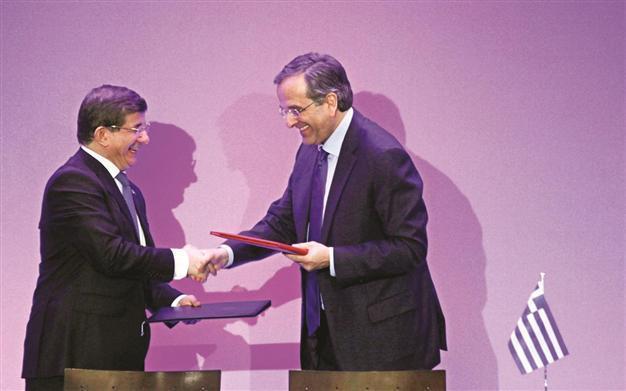Turkey, Greece cement ties, seek ways to resume Cyprus peace talks
ATHENS

Greek Prime Minister Antonis Samaras (R) and Turkish Prime Minister Ahmet Davutoğlu shake hands and exchange the agreement they signed during a Greek-Turkish High Level-Cooperation Council in Athens. AP photo
Turkey and Greece have reiterated their commitment to further develop bilateral ties through cooperation in various fields, including supplying natural gas to European markets, while intensifying their efforts to resume Cyprus reunification talks as two guarantor countries.Turkey and Greece held a High-Level Strategic Council meeting in Greece over the weekend under the co-chairmanship of the countries’ two prime ministers, Ahmet Davutoğlu and Antonis Samaras, with the participation of nine Turkish and 10 Greek ministers.
“On Cyprus, we want negotiations to begin as soon as possible. We held very positive talks [with Greece]. They will continue. We embrace the approaches that put our mutual interests forward in the Eastern Mediterranean and in the Aegean,” Prime Minister Davutoğlu said at a joint press conference on Dec. 6 in Athens. Davutoğlu expressed his wishes for a quick recovery for Greek Cypriot President Nikos Anastiasadis, who recently underwent cardiac surgery, and stressed that Turkey prioritizes the re-commencement of suspended talks between the Turkish and Greek Cypriots.
Greek Cyprus had announced in October the suspension of peace talks as a result of a crisis in the Eastern Mediterranean, which was sparked after it accelerated oil exploration drills off Cyprus. Turkey sent the seismic research vessel Barbaros to nearby regions for its own oil exploration and deployed a warship to closely follow the activities of a Greek Cyprus platform in the island's disputed economic zone.
Greek Prime Minister Samaras said Athens understands Anastiasadis’ decision to halt talks, but also expressed his wishes for a resolution to the problem.
Greek Cyprus’ condition for the resumption of talks is Turkey’s withdrawal of Barbaros and its warship from the region.
Talks over a formula
With no immediate indication of how talks could be resumed, the two prime ministers instructed the undersecretaries of their foreign ministries to seek a formula. The first meeting between high-level diplomats was conducted in Athens on Dec. 6, with the Turkish team led by Feridun Sinirlioğlu.
Previously, both Davutoğlu and Turkish Foreign Minister Mevlüt Çavuşoğlu stressed that Turkey could end its search if Greek Cyprus were to do the same, suggesting the establishment of a joint private company to conduct research on behalf of both Turkish and Greek Cypriots.
However, Turkey’s suggestions have not been met positively, as Greek Cypriots insist on the withdrawal of Turkish vessels from the region. Diplomatic sources familiar with the talks said “not much should be expected from the Greek Cypriots if this condition isn't met.”
In the meantime, there are reports about the Greek Cypriot government drafting a law on sharing oil and natural gas revenues with the Turkish Cypriots.
“In fact, both sides [Turkish and Greek Cypriots] agree that all the island's natural resources belong to both sides. There is an agreement on that. What is important is how this process will be carried out by the two sides afterward. It’s important that they avoid unilateral moves,” Davutoğlu said.
'No psychological barriers between Turkey and Greece'
More broadly, the meetings saw Turkey and Greece conclude a new round of strategic cooperation council meetings, which were launched in 2010 and have produced nearly 50 documents to deepen and diversify bilateral relations, especially in the fields of trade, tourism, energy, transportation and culture. “We have done this successfully up until today and we are determined to continue in the same way,” Davutoğlu said.
There are two important elements that have increased the ability of the two sides to move together, he added. “First, there are no longer psychological barriers. While our ministers are exchanging views, they no longer worry about how their words would be regarded by the other side,” he said.
The second element is the realization of the complementary quality between the two sides, Davutoğlu said. “For example, in transportation. Our transportation policies complement each other; sea transportation in the Aegean, land and air transportation. It’s a great possibility that the closest land transportation from Midilli (Lesbos Island) to northern Greece will be through the [under-construction] Çanakkale Bridge. Just imagine building a high-speed train from Istanbul to Thessaloniki; in that way, two important historical cities will be linked to each other,” he added.
Greek support To Turkey’s EU bid
Davutoğlu also expressed his appreciation of Greece’s support for Turkey’s EU accession process. “In the past, there were periods where some countries tried to hide their opposition [to Turkish accession] by hiding behind Greece, as if Greece was against Turkish membership. But today, Greece is expressing its support for Turkish membership on every platform,” he stated.
The Turkish prime minister openly asked Greece to pioneer efforts to open new negotiation chapters as part of Ankara’s membership talks. “It’s our hope that Turkey’s EU process will be finalized with the support of Greece. Everyone will realize that in addition to Turkey and Greece winning by the conclusion of this process, Europe will also win,” he said.
















